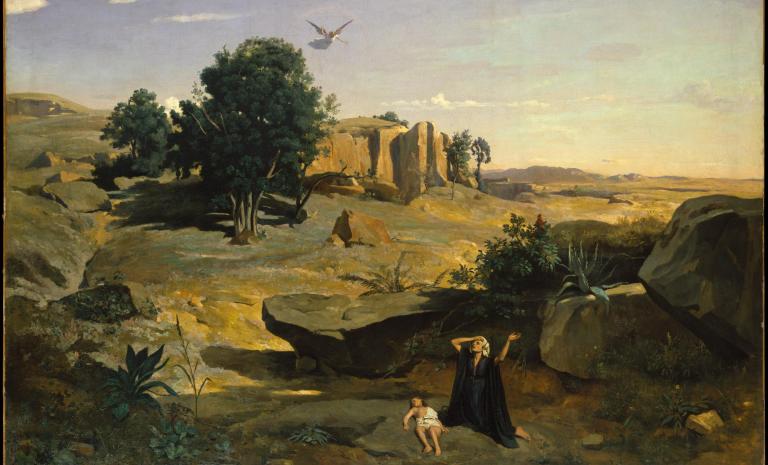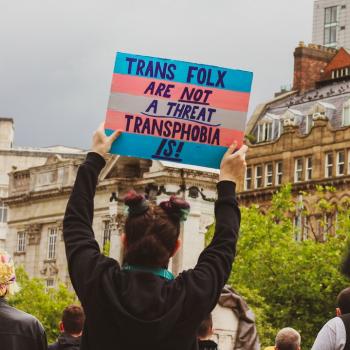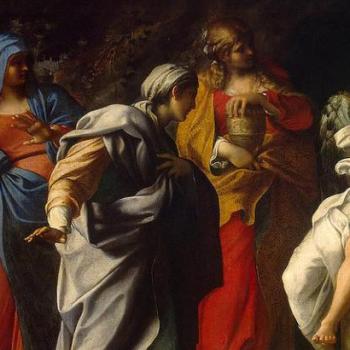Hagar: Seen by God
By Carrie Badertscher
Read Genesis 16; 21:8–21
She is a gift from Pharaoh to wealthy nomads. A goat, some sheep, and an immigrant slave girl—all given to Abram and Sarai who are first thought to be brother and sister by Pharaoh, but in reality are husband and wife.
The immigrant slave girl is Hagar. She is an Egyptian whose name in Hebrew means “foreign thing.” Her position and power are restricted by ethnic, class, and gender boundaries. Having no power in her own right, she is given as a maidservant to Sarai, whom she would now serve all the days of her life. This role would leave little room for her to be human, but it would provide the guarantee of protection from hunger and violence under Hebrew custom and law.

After ten years of infertility, Sarai devises a plan to give her maidservant, Hagar, to her husband, Abram, in hopes of bearing a son. Offering a concubine to a husband to produce offspring is not uncommon at this time, nor is this act of sexual exploitation considered violence. Again, it is just part of the guaranteed protection under Hebrew law. Hagar’s body and life are not her own; both can be used as resources by her owners. Her womb will be utilized to grow an heir for her owners, a child that she will have no rights to after the child’s birth.
Hagar lays with Abram and conceives with him a son.
As Hagar’s son grows in her womb, so grows the bitterness in her heart toward Sarai. In return, Sarai’s contempt for Hagar’s defiant behavior grows as well. Contempt meets with contempt, Sarai’s oppression and maltreatment of Hagar abound, and Hagar is left with few options but to flee to the wilderness in search of relief.
So flee, she does. Hagar, now a pregnant runaway, escapes her oppressor and takes refuge by a spring of water in the wilderness along the road to Shur. She knows the perilous journey she will need to take back to Egypt and the danger that will meet her there as a slave with no protection provided by her masters. Still, the thought of continuing in her current reality is too much to bear.
Then she meets God, in the form of a messenger who finds her by the spring in the wilderness.
“Hagar, Sarai’s servant, where have you come from, and where are you going?” a voice asks her (Gen. 16:8, NLT).
The messenger identifies Hagar first by her personhood, then by her position. Up to this point in the story, Hagar is only referred to as “slave girl.” The moment she meets God, locking eyes from a place of deep despair, uncertainty, pain, and rejection, God calls Hagar by name, offers dignity to her as a whole person created in the image of God.
And then God declares a plan and a promise:
“Return to your mistress, and submit to her authority.”
“I will give you more descendants than you can count.”
“You are now pregnant and will give birth to a son. You are to name him Ismael (which means, ‘God hears’), for the Lord has heard your cry of distress” (Gen. 16:9–11).
Hagar, the cries of your heart have interfused with the very heart of God. God hears your cry and has come to your aid.
In response, Hagar gives God a name: “You are the God who sees me” (Gen. 16:13).
For the first time in biblical history, a person has both the courage and certitude to give God a name. Hagar is seen by God and sees God in return. She declares that God is El Roi—The God Who Sees.
Hagar responds to God’s plan and promise with fierce faith. She returns to Abram and Sarai, bears a son, Ishmael, and serves Sarai for the next seventeen years. During this time, Abram and Sarai are given new names by God—Abraham and Sarah—and Sarah gives birth to a son, Isaac.
When Hagar’s son, Ishmael, is seventeen years old and Sarah’s son, Isaac, is just three, Abraham plans a feast to celebrate the weaning of Isaac from Sarah’s breast. During the celebration, Ishmael is caught mocking Isaac, which infuriates Sarah.
Sarah demands of Abraham, “Get rid of that slave woman and her son. He is not going to share the inheritance with my son, Isaac. I won’t have it!” (Gen. 21:10)
Although Sarah’s demand troubles Abraham because he loves his son Ishmael, Abraham gets up early the next morning, straps a bag of provisions to Hagar’s back, and sends Hagar and their son, Ishmael, into the wilderness.
When the provisions run out, Hagar in her distress places Ishmael beside a bush and then positions herself nearly a hundred yards away. She knows what is to come and can’t bear the thought of watching her son suffer and die under the unforgiving desert sun.
Just as all hope seems lost, The God Who Sees engages Hagar once again.
“Hagar, what’s wrong? Do not be afraid! God has heard the boy crying as he lies there. Go to him and comfort him, for I will make a great nation from his descendants” (Gen. 21:17–18)
God opens Hagar’s eyes, and she sees a well full of water. She quickly fills her water container and gives Ishmael a drink. And, the narrator tells us, God is with Ishmael as he grows up in the wilderness.
God does not ask Hagar to return to Sarah and Abraham. Instead, God promises to provide for Hagar and Ishmael right there in the wilderness. Hagar and Ishmael no longer need protection provided by the headship of masters, for God ensures that God will be near. Not only will God provide for their physical needs; God promises to establish Hagar as the matriarch and Ishmael the father of a great nation of descendants, and that is exactly what God does.
In the Kingdom of God, the cries of the oppressed are heard. Those who are treated as a resource instead of a human being are seen. The immigrant, alone and displaced, is sought after. The exploited worker is offered a well of living water. An abused concubine can be the matriarch of a great nation. A slave woman is just as important as the Father of Israel. This is the story of Hagar.
Though this world has constructed systems used to oppress individuals with ethnic, class, and gender boundaries, the Kingdom of God does not. A fiercely faithful God, seen through the story of Hagar, presents a different reality—one of inclusion, acceptance, and provision, regardless of any status or classification. Hagar, fully seen and cared for, responds to God’s fierce faithfulness with her own fierce faithfulness, living the rest of her days as the one who has seen The God Who Sees.
This post is part of the series Fiercely Faithful: Rad Women of Scripture. See also Eve: Mother to All.












